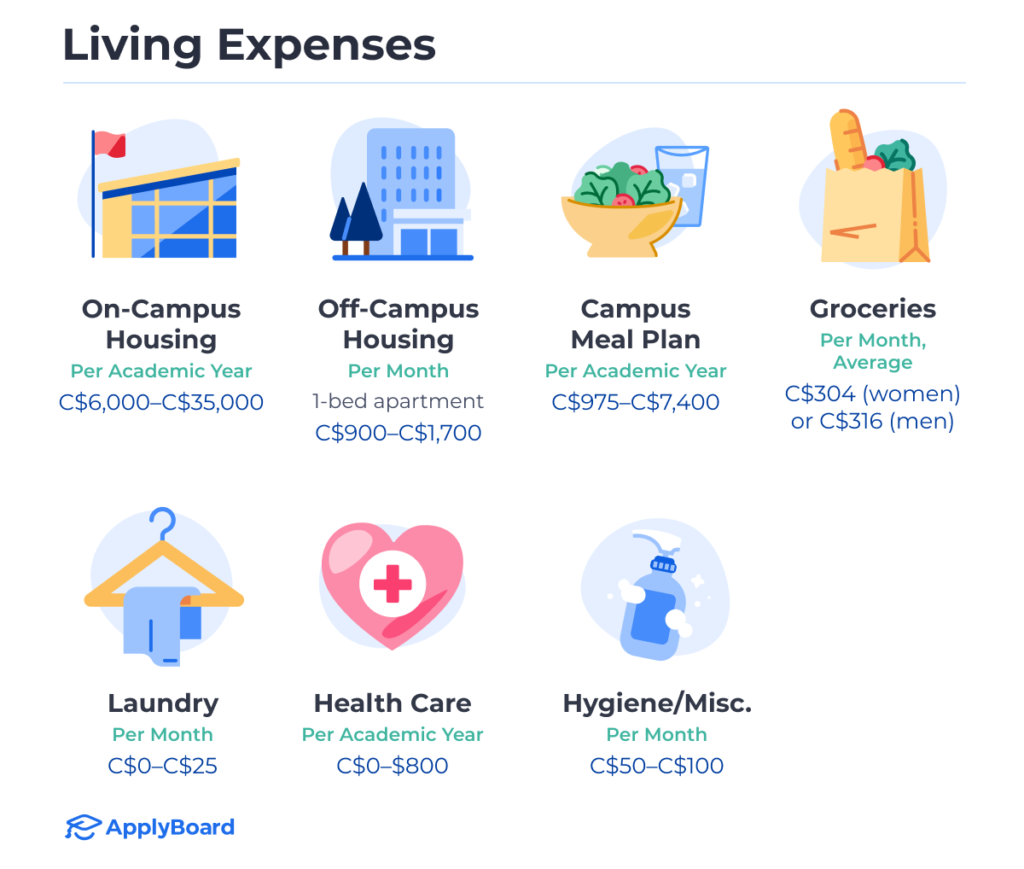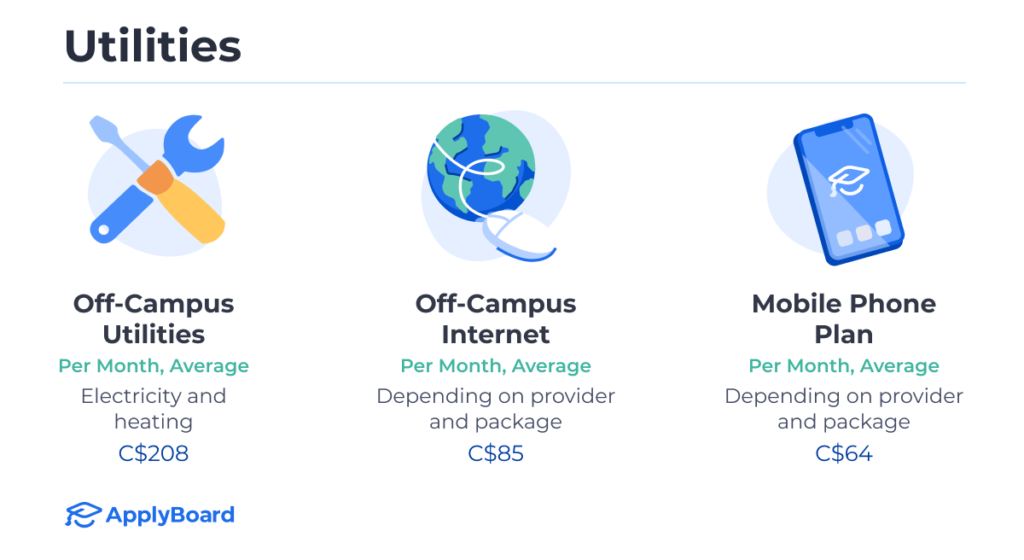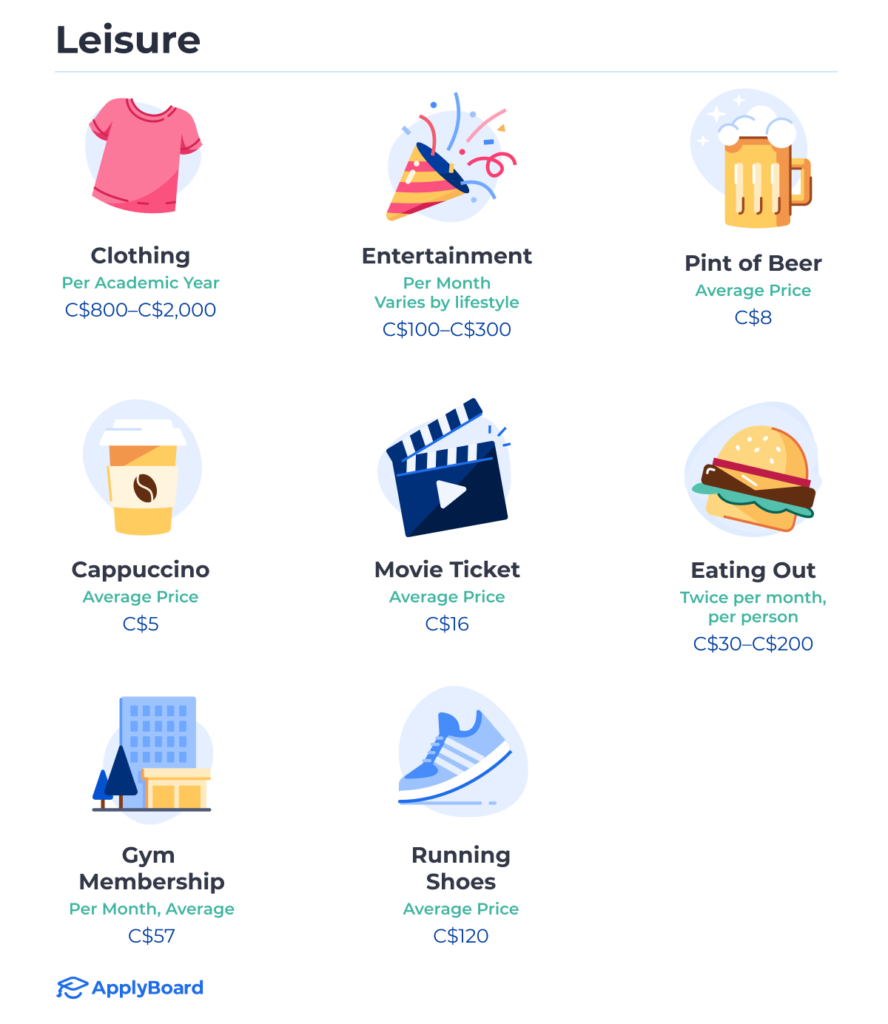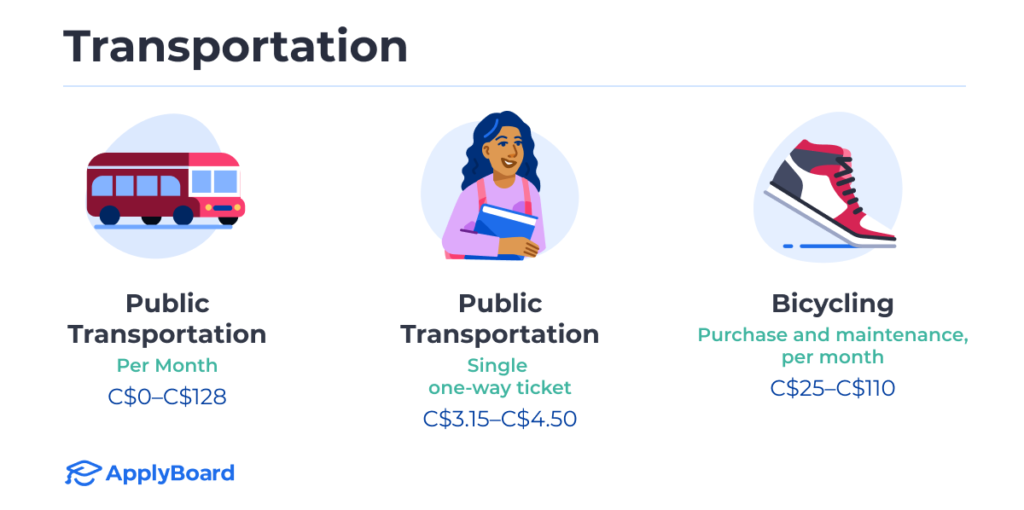Are you planning to become an international student in Canada? It’s important to prepare for the cost of daily life in Canada so you can focus on your studies. To understand your spending habits and prepare for big purchases, it’s a good idea to create both a yearly and a monthly budget. This will help you cover regular expenses like groceries, and larger one-time purchases like a warm winter coat. To help you get started, we’ve taken a closer look at the current cost of living in Canada.
While these numbers are current as of September 2024, it’s a good idea to check a cost of living calculator before drafting your own budget. Average prices can change regularly. In fact, these changes contributed to why the financial requirement for Canadian study permit applications increased at the start of 2024 (and will continue to change yearly). This requirement reflects how the cost of living in Canada continues to evolve.
Are you still deciding where you want to study? Check out our updated blogs on the cost of living in the United Kingdom and the United States in 2024. Stay tuned for a refreshed post on Australia later this week!
Living Expenses
In 2024, Canada was ranked the 24th most expensive country in the world. Among popular study destinations, it was ranked more affordable than Ireland (13th), Australia (16th), and the United States (20th). While it’s more affordable than some other destinations, Canada’s relatively high cost of living on a global scale means that everything from rent to restaurant food may be more expensive than you’re used to.
Below, we’ve shared estimates for some essential cost of living expenses:1

When choosing where you want to study in Canada, ask yourself:
- Which province do I want to study in?
- Which institution and program is right for me?
- Do I want to live on- or off-campus?
Usually, rural areas will be more affordable than living in a city, but they often won’t have the same range of services and activities. When it comes to Canadian cities, rent in Vancouver is higher on average than anywhere else in Canada (Toronto is second-most expensive). If you’re looking for a less expensive option, Montreal and Quebec City are the two most affordable major cities in Canada.
While housing costs are a significant part of your budget, tuition will likely be your largest expense—and it can vary a lot depending on where you choose to study in Canada.
Utilities
Utility bills are often overlooked, but you need to factor them into your monthly cost of living. If you’re living on campus, your basic utilities are included in the price of your student housing. Typically, wifi is included, too.
Living off-campus? Your monthly rent may include some or all of your main utilities, though almost never Internet/wifi. It’s important to know if you have to pay utilities separately, and if you do, which ones, and how often.
Common utilities include:
- Water
- Heating
- Electricity
- Internet
These bills may go up or down depending on how many roommates you have, as well as your location, lifestyle, and local climate. Depending on the city or province you live in, some utilities may have additional charges for service delivery:2

As you move in, ask your landlord or apartment manager what the average cost of utilities is. This can help you understand if your bill is way lower or higher what people typically pay. If it’s higher, something in your living space might need a repair, like drafty windows letting heat out in the winter—be sure to speak to your landlord or apartment manager if this is the case!
No matter where you’re living, you’ll need to cover the cost of your mobile phone. When you first arrive in Canada, research different phone companies and ask about their packages for international students. You may be able to get special benefits or a discounted price.
Some international students will also need separate health and travel insurance. Read our blog on how international students can get health insurance in Canada to learn more!
Leisure
Studying abroad isn’t just about receiving an excellent education; it’s also about the experiences and fun you’ll have along the way. That’s why we encourage you to save part of your budget for leisure activities:3

Consider what brings you joy. If you love live music, save your leisure budget for a special concert. Or, if you enjoy seeing the newest movie in theatres, budget for that instead.
The great thing is this section is completely dependent on you. If you had an expensive month last month, you can stay in for a few Friday nights to cut back on your spending. Or, use the campus gym instead of spending extra on a fancier gym membership. Remember, balance is key.
From thrifting to volunteering, here are some of our top tips for making the most of your student budget.
Transportation and Academic Supplies
It’s good to estimate how much you’ll spend getting around your community. Classes may be nearby, but you’ll need to do grocery runs, too. Depending on where you live in Canada, you may find yourself using a train, bus, rideshare car, bike, or taxi as a means of transportation:4

Check if your academic institution offers student discounts for public transit. At some institutions, a full transit pass is built into your tuition fees: in those cities, just tap your student card to ride the bus or metro. Another bonus to living on campus is that in many cities, you’ll be within walking distance of most amenities.
Tip: Public transportation is cheaper than taking a rideshare (like Lyft or Uber), but transit can take more time. Consider doing your class readings while on transit to use that time wisely.

You can save money on academic supplies by being organized and resourceful.5 Start searching for textbooks as soon as you receive your reading list for the semester. Try to rent books if you can. Or, buy them second-hand from your academic institution’s bookstore, Facebook Marketplace, or Kijiji.
If you’re buying books from someone online, be safe: go with a friend to do a porch pick-up or meet somewhere public on campus.
Looking to save on writing supplies? Reuse pens, paper, and binders where you can, and go to campus job fairs to find free branded stationery supplies.
Learn about part-time jobs in your new community at a campus job fair! Check out our top list of strategies that can help you stand out to employers.

We hope the estimates above will help you as you begin budgeting for your study journey to Canada. It’s never too early to start planning!
Take the next step: explore the free ApplyBoard platform to find a program that fits your goals.
FOOTNOTES:
1. Sources: Scotiabank, “How to manage your money as an international student” (on-campus housing); ApplyBoard, “The Cost of an International Education in Canada in 2024” (off-campus housing); Queen’s University, “Campus Meal Plans” and University of Guelph, “Student Meal Plans, 2024-25” (meal plans); Dalhousie University et al, Canada’s Food Price Report 2024, 14th edition. (groceries); Western University, “Making a Budget” (laundry and hygiene); LIC Insurance, “How Much is Health Insurance in Canada for International Students” (health care)
2. Numbeo, “Cost of Living in Canada.”
3. All numbers are from Numbeo, “Cost of Living in Canada,” except the Clothing and Entertainment fields, cited from Western University’s “Making a Budget.”
4. Sources: Toronto Transit Commission. “Fares and passes“; Josh Pringle, CTV News. “Here’s how OC Transpo fares compare to other transit systems in Canada“; Bruce Lin, The Pro’s Closet. “How Much Does a Bike Cost? How Much Should You Spend on Your First Bike?“; and Quora, “How much does it cost to maintain a road bike?“
5. Western University. “Making a Budget.”







